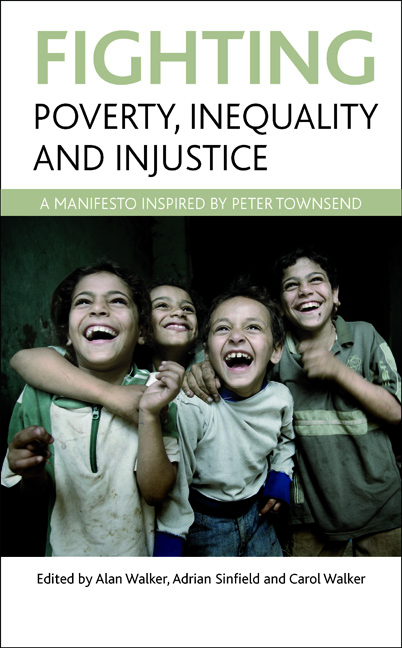Book contents
- Frontmatter
- Dedication
- Contents
- List of figures and tables
- Preface
- Notes on contributors
- one The legacy of Peter Townsend
- two The making of a pioneer researcher: reflections from Peter Townsend’s life story
- three Peter Townsend, a man ahead of his time: re-reading The family life of old people and The last refuge
- four The case for universal child benefit
- five Poverty
- six Social justice for children: investigating and eradicating child poverty
- seven For universalism and against the means test
- eight Underclass, overclass, ruling class, supernova class
- nine Addressing health inequalities: building on Peter Townsend’s legacy
- ten Towards a new sociology of ageing: from structured dependency to critical gerontology
- eleven Disability: prospects for social inclusion
- twelve Putting the lawyers in their place: the role of human rights in the struggle against poverty
- thirteen Radicalising social policy in the 21st century: a global approach
- fourteen Conclusion: building on the legacy of Peter Townsend
- Index
nine - Addressing health inequalities: building on Peter Townsend’s legacy
Published online by Cambridge University Press: 01 September 2022
- Frontmatter
- Dedication
- Contents
- List of figures and tables
- Preface
- Notes on contributors
- one The legacy of Peter Townsend
- two The making of a pioneer researcher: reflections from Peter Townsend’s life story
- three Peter Townsend, a man ahead of his time: re-reading The family life of old people and The last refuge
- four The case for universal child benefit
- five Poverty
- six Social justice for children: investigating and eradicating child poverty
- seven For universalism and against the means test
- eight Underclass, overclass, ruling class, supernova class
- nine Addressing health inequalities: building on Peter Townsend’s legacy
- ten Towards a new sociology of ageing: from structured dependency to critical gerontology
- eleven Disability: prospects for social inclusion
- twelve Putting the lawyers in their place: the role of human rights in the struggle against poverty
- thirteen Radicalising social policy in the 21st century: a global approach
- fourteen Conclusion: building on the legacy of Peter Townsend
- Index
Summary
Introduction
Peter Townsend has been an inspiration to me and to many others in using his science and his art to press for more effective action, no more so than on the issue of health inequalities. This has always been a highly charged field politically, and sometimes it has felt like playing a game of snakes and ladders – making some advances then slipping back down again – but Peter's example has helped us all persevere despite set-backs.
This chapter therefore starts by paying tribute to how much Peter has shaped the health inequalities policy debate in this field, before looking to the future and singling out key academic and political challenges. On the academic front, the chapter argues that there is an enormous research challenge in devising ways of evaluating the health and health inequalities impact of major social policies that have the potential to have the greatest impact on the wider social determinants of health. These include both universal welfare policies and the health effects of the ‘poor social policies and programmes, unfair social arrangements and bad politics’ identified as causes of health inequalities by the global Commission on Social Determinants of Health (CSDH). On the political front, the chapter focuses on an issue that unites Peter's concerns for global poverty with those of health: how poor health generates poverty and what can be done about it. One particularly disturbing development is singled out for closer scrutiny: that of the ‘medical poverty trap’, in which having to pay for essential health services out-of-pocket impoverishes households: that is, the health system itself is a poverty generator. This is a growing problem affecting an alarming number of people in many low- and middle-income countries, brought on, as the chapter argues, by aggressive policies of privatisation and the commercialisation of healthcare services pushed by international institutions. The final section of the chapter discusses what needs to be done to make a start on addressing this issue.
Campaigning in a cold climate
Today, we have a climate that has never been more sympathetic towards tackling inequalities in health. More and more countries are accepting that they have unacceptable and sometimes widening inequalities within their countries and they are concerned to take action.
- Type
- Chapter
- Information
- Fighting Poverty, Inequality and InjusticeA Manifesto Inspired by Peter Townsend, pp. 175 - 192Publisher: Bristol University PressPrint publication year: 2011



